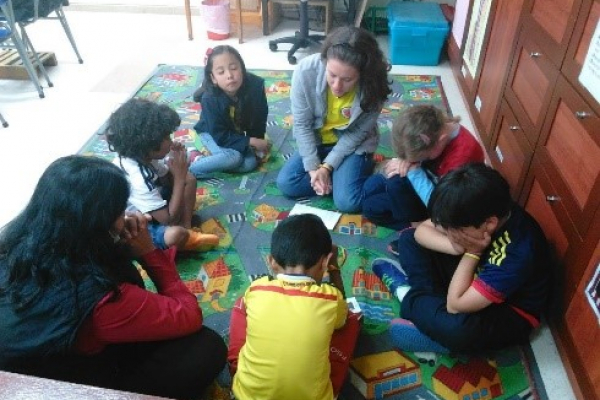Equipping Students to Manage Disappointments

As educators, you can feel responsible for so much more than teaching your students about an academic subject area. On a given day, you may feel like a coach, a parent, a mentor, and even a counselor. One of the more common challenges faced by our students is that of disappointment, and we want to equip you in helping your students through this. In this article, we will discuss how to identify disappointment in students, how to respond to disappointment, and how to help others with disappointment.
Identifying disappointment in students
We might expect emotions like disappointment to show up looking like sadness, but, like many of our emotions, disappointment can come out sideways, showing up under the guise of anger, withdrawal, irritability, and even silliness. Depending on the chronological and developmental age of our students, it’s always a good idea to put on our detective’s hat if a student is acting a little bit out of the ordinary. Ask a few questions with gentleness and curiosity, and you might be surprised by the answer you’re given. When it comes to emotions, including disappointment, we do not want to assume that our students, even our older students, know what disappointment feels like or how to identify it within themselves. Many of us, raised by the most well-intentioned of parents or guardians, were not intentionally taught emotional self-awareness. This emotional self-awareness involves being able to identify what emotions feel like; where we experience emotions within our bodies; and how to slow down long enough to identify what is happening inside of us. This is a great social-emotional lesson to have within your classroom, whether you teach kindergarten or upperclassmen in high school. Ask students to close their eyes and begin to notice what they are feeling and where they are feeling it. For students who struggle to identify their feelings, you can provide them with a list of emotions as prompts. As students grow in their self-awareness, they’ll then be able to grow in their self-regulation and self-advocacy skills.
How to respond to disappointment
When disappointment arises, it can show up like a brief twinge of feeling bummed, all the way to feeling like a deep sense of grief. The first thing we can do as educators is acknowledge disappointment as being within the normal spectrum of human emotion. Unmet expectations = disappointment, and, unfortunately, this is a universal phenomenon. Our self-talk, which is the story we tell ourselves, matters immensely when we are faced with disappointment. Imagine three students receive poor grades on an exam. Student #1 thinks, “Of course this happened.  Why care?” Student #2 thinks, “This is terrible. I am a failure. No college will want me.” Student #3 thinks, “Ugh, this is not good. I know I tried my best. I guess I need to ask for help.” None of these students is in denial about the bad grade. Each student is aware that an expectation has not been met. What we hope is that, in the process of acknowledgement, our students can still love and appreciate themselves, can view themselves as capable of growing and learning, and can consider themselves worthy of receiving help, whether it’s academic help or emotional support. This ability to see ourselves as worthy of love, in spite of failure, comes hand-in-hand with the sense that we are loved and cherished by God, and is another great lesson to bring into your classroom. As educators, you have hundreds of opportunities each academic year to discuss disappointment with your students, as well as healthy, productive, and loving ways to respond to ourselves when faced with disappointment.
Why care?” Student #2 thinks, “This is terrible. I am a failure. No college will want me.” Student #3 thinks, “Ugh, this is not good. I know I tried my best. I guess I need to ask for help.” None of these students is in denial about the bad grade. Each student is aware that an expectation has not been met. What we hope is that, in the process of acknowledgement, our students can still love and appreciate themselves, can view themselves as capable of growing and learning, and can consider themselves worthy of receiving help, whether it’s academic help or emotional support. This ability to see ourselves as worthy of love, in spite of failure, comes hand-in-hand with the sense that we are loved and cherished by God, and is another great lesson to bring into your classroom. As educators, you have hundreds of opportunities each academic year to discuss disappointment with your students, as well as healthy, productive, and loving ways to respond to ourselves when faced with disappointment.
How to help others with disappointment
Many students also want to know how to support their friends during times of disappointment. This can feel like a daunting task when we don’t particularly feel like our own needs for comfort or being understood are being met. When it comes to supporting our peers, we want to focus on acknowledging what they’re going through and how they say it feels. It doesn’t matter whether or not we would feel the same way in the same situation. What matters is that we see and acknowledge what someone else is going through. This can be incredibly powerful in the lives of those around you, and surprisingly does not ask much of us. We do not need to find a silver lining or the bright side for a friend who is disappointed; we do not need to reframe their  situation or even feel responsible for cheering them up. We can simply say, “I can tell by what you’re saying (or by the look on your face) that this is hard for you. You’re really disappointed. It’s okay to feel that way. Is there anything I can do to help?” If everyone had a friend who saw them in this way, there would be a lot less loneliness in the world.
situation or even feel responsible for cheering them up. We can simply say, “I can tell by what you’re saying (or by the look on your face) that this is hard for you. You’re really disappointed. It’s okay to feel that way. Is there anything I can do to help?” If everyone had a friend who saw them in this way, there would be a lot less loneliness in the world.
As an educator, you again have so many opportunities to bring this into the classroom. For example, you can weave it into a lesson or class discussion as you share an experience you had with disappointment and how you dealt with it: “This thing happened, and I’m so disappointed about it. You know, I might never know why this happened. But here’s how I’m taking care of myself and here’s how I’m talking to God and to myself about it. And here’s the most helpful thing that someone in my life has said to me about this situation.” Normalize this for your students, and they will feel less alone the next time they experience their own version of disappointment.
Sarah Fine
Sarah is a licensed clinical social worker and previously served with TeachBeyond as a school counselor. Her husband, Keane, is TeachBeyond’s Director of Communications. Sarah has been a guest on TeachBeyond’s podcast, Transformed & Transformational, where she shared about processing loss. You can listen to that podcast here.
Photo Credits
Teacher with Girl. Shutterstock. Resized.
Caring for Each Other. Shutterstock. Resized.
Reading Examination. Shutterstock. Resized.



